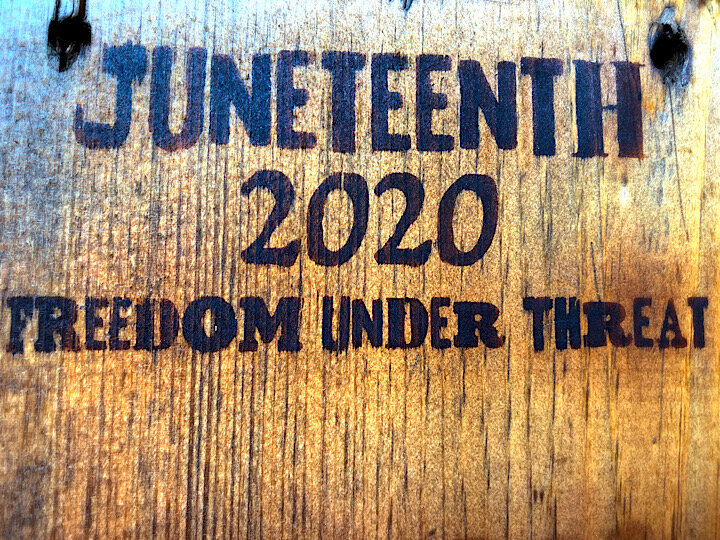JUNETEENTH Virtual Tour 2018
HAs the Promise of Emancipation been fulfilled?
Episode 1
FREEDOM: The Emancipation PROCLAMATION
Main Street (5 Saints Distiller - The Tone Building)
This year the tours begin with a reading from the Emancipation Proclamation. The document's promise of freedom for slaves is a far more extensive executive order than simply giving liberty to slaves. It lists a series of rights that mist be afforded to these freed slaves and especially people of color, or else the state not providing the rights and protections is in rebellion to the federal government.
Although this document is not the document that truly freed the slaved at the end of the war and inspired Juneteenth as a holiday, it is a framework for our treatment of emancipation and informed the rest of the tour content. The remaining pieces in this tour will reflect on the promises made in the proclamation and the issues of rebellion and responsibility to those promises
Dave Fiebert reads from the document recreating the second hand proclaiming that was done in the period.
The full text can be found HERE
The document in images can be found HERE
Episode 2: H Ford Douglas
I Do Not Trust the Emancipation of Abraham Lincoln 1860
Penn Street and DeKalb
The second stop on this tour is the first historic reflection on the proclamation. Even before Lincoln issues the Emancipation Proclamation, there was a great deal of conversation across the US about Lincoln's position, our time is not particular in its partisanship. Four Douglas was a contemporary of Frederick Douglas and a noted abolitionist. He was also an African American from Illinois. As such, he was in demand to speak to Lincoln (also a native of Illinois.) This fiery speech asks big questions about Lincoln's actual beliefs, the state of the nation in relationship to race and the issues of the proclamation three years before it is read.
Richard Bradford breaths life into Douglas, who uses extraordinary language, contemporary politicians have no corner on the sound bite, and vivid imagery to press his point.
The full text of the speech can be found HERE
Episode 3: Angela Davis POLITICAL PRisoner 1971
Theatre Horizon Penn Street
Angela Davis began life in Dynamite Hill in Alabama, named because of the insensate bombing of her middle class neighborhood by the KKK. She later joined the Black Panther Party and began a life long focus on the issues of the American justice system and in particular, issues of prisons, race and poverty. As a panther, her vision for justice is focuses on Black American issues but also extends to include all people, all races.
The full text can be found HERE
Episode 4: Malcolm X
At The audubon
Courthouse Courtyard Pavilion Airy Street
This speech, giving at the location where he was later murdered, is a powerful statement to the issue of freedom in America. Malcolm X clarifies his position on the use of force and violence and frames his thinking on issues of poverty and capitalism. Malcolm X present his vision of the black experience in America s unique from any other population.
Dwayne Thomas brings a light, thoughtful and passionate flavor to this speech as Malcolm X.
The full text of the speech can be found HERE
Episode 5: Lynching
Ida B Wells 1905
Airy and Swede (Site of First Baptist Church)
This powerful speech, full of disturbing data, was presented by Wells in Chicago. It raises questions of black suffering at the hands of the judicial system, the regular citizens and the police. The resonance of this speech in relationship to White supremacist thought today is startling. Wells calls out the illegitimacy of women being the victim and cause that leads to lynchings. From 1882-1968, 4,743 lynchings occurred in the United States. Of these people that were lynched 3,446 were black. The blacks lynched accounted for 72.7% of the people lynched.
Our production takes the speech and treats the audience as a test crowd to hear Wells words intimately and as in under revision. Baset's youthful and self aware presentation adds color to the text.
Read the full text HERE
Get more information and experience of Lynching in America HERE
Episode 6: "Blink Your Eyes"
Sekou Sundiata
Hancock Square
This poem, framed by a police stop, is performed by the extraordinary Carlo Campbell. More experiential than the rest of the tour, BLINK YOU EYES, considers the life of a black man in America, like the slave that was forced to America in the Middle Passage. The poem, founded on the journey of one man to the person he loves.
Find the full text of BLINK YOUR EYES HERE
Video Shot by Rebel Hill Media (Josiah Blizzard) and Bella Pipitone
Event Sponsors: Montco Today, Norristown NAACP, Milligan and Co. LLC, Montgomery County Chamber of Commerce, Municipality of Norristown, ACLAMO,
If you would like to sponsor the event, please contact us.
Directed managed by John Doyle Designed by John Doyle and Richard Bradford




